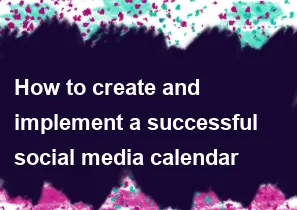How to create and implement a successful social media calendar

Creating and implementing a successful social media calendar requires careful planning, organization, and consistency. Here's a step-by-step guide to help you develop and execute an effective social media calendar:
Define Your Goals:
- Clearly outline your social media objectives. Are you aiming to increase brand awareness, drive website traffic, or boost engagement? Your goals will shape your content strategy.
Know Your Audience:
- Understand your target audience's preferences, behaviors, and demographics. Tailor your content to resonate with your audience and provide value to them.
Choose Platforms:
- Identify the social media platforms that align with your business and target audience. Focus on the platforms where your audience is most active.
Content Themes and Categories:
- Establish content themes and categories that align with your brand and resonate with your audience. This ensures a diverse and interesting content mix.
Content Calendar Tools:
- Choose a social media management tool or platform to schedule and track your posts. Popular tools include Buffer, Hootsuite, or the scheduling features built into the platforms themselves.
Create a Content Calendar Template:
- Use a spreadsheet or a calendar tool to create a content calendar template. Include columns for the date and time of posting, content type, caption, relevant hashtags, and any multimedia elements.
Frequency and Timing:
- Determine how often you'll post on each platform. Consider the optimal posting times for your audience based on their habits and time zones.
Balance Your Content:
- Maintain a balance between promotional content, educational content, entertaining content, and user-generated content. Avoid being overly promotional, and strive to provide value to your audience.
Evergreen and Trending Content:
- Include a mix of evergreen content (timeless and always relevant) and trending content to stay current and engage with current conversations.
Monitor Analytics:
- Regularly analyze your social media analytics to understand what types of content are performing well and adjust your strategy accordingly. Pay attention to metrics like engagement, reach, and click-through rates.
Collaborate and Engage:
- Plan collaborations, partnerships, and engagement activities in your calendar. Respond promptly to comments, messages, and mentions to foster a sense of community.
Adapt and Iterate:
- Be flexible and open to adapting your social media calendar based on changes in trends, audience preferences, or unexpected events. Regularly review and iterate your strategy.
Legal and Compliance Considerations:
- Ensure that your content complies with legal and industry regulations. Review and update disclaimers, terms of service, and other relevant documents regularly.
Consistency is Key:
- Stick to your schedule and maintain a consistent posting frequency. Regular and predictable posting helps build audience trust and keeps your brand top of mind.
Team Collaboration:
- If you're working with a team, use collaboration tools to ensure everyone is on the same page. Communication is crucial for a cohesive social media strategy.
By following these steps and consistently executing your social media calendar, you'll be well on your way to building a strong online presence and achieving your social media goals.
-
Popular Post
- How to optimize for Google's About This Result feature for local businesses
- How to implement multi-language support in an Express.js application
- How to handle and optimize for changes in mobile search behavior
- How to handle CORS in a Node.js application
- How to use Vue.js with a UI framework (e.g., Vuetify, Element UI)
- How to configure Laravel Telescope for monitoring and profiling API requests
- How to create a command-line tool using the Commander.js library in Node.js
- How to implement code splitting in a React.js application
- How to use the AWS SDK for Node.js to interact with various AWS services
- How to use the Node.js Stream API for efficient data processing
- How to implement a cookie parser middleware in Node.js
- How to implement WebSockets for real-time communication in React
-
Latest Post
- How to implement a dynamic form with dynamic field styling based on user input in Next.js
- How to create a custom hook for handling user interactions with the browser's device motion in Next.js
- How to create a custom hook for handling user interactions with the browser's battery status in Next.js
- How to implement a dynamic form with dynamic field visibility based on user input in Next.js
- How to implement a dynamic form with real-time collaboration features in Next.js
- How to create a custom hook for handling user interactions with the browser's media devices in Next.js
- How to use the useSWRInfinite hook for paginating data with a custom loading indicator in Next.js
- How to create a custom hook for handling user interactions with the browser's network status in Next.js
- How to create a custom hook for handling user interactions with the browser's location in Next.js
- How to implement a dynamic form with multi-language support in Next.js
- How to create a custom hook for handling user interactions with the browser's ambient light sensor in Next.js
- How to use the useHover hook for creating interactive image zoom effects in Next.js